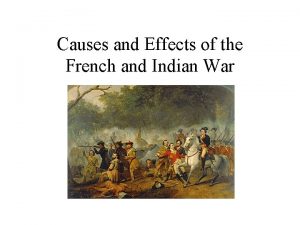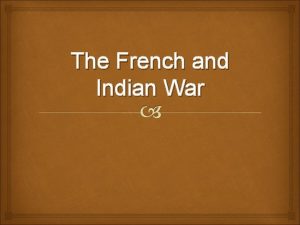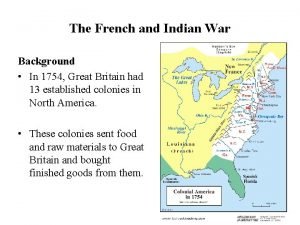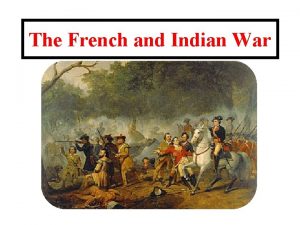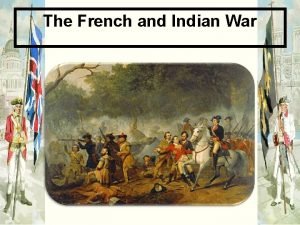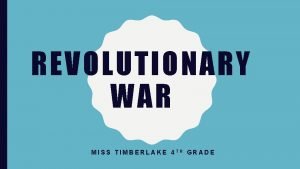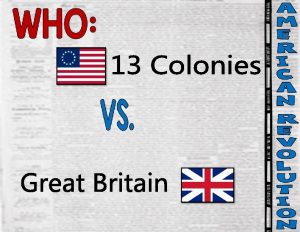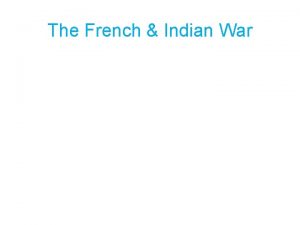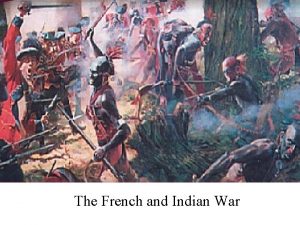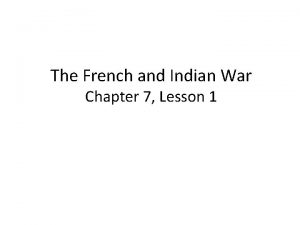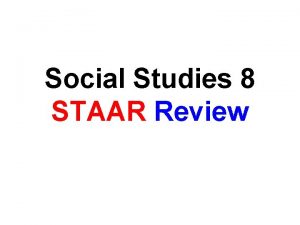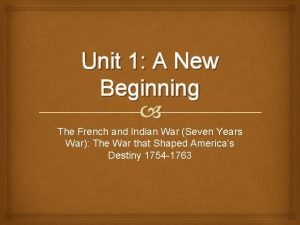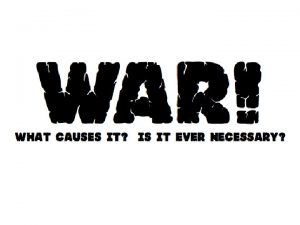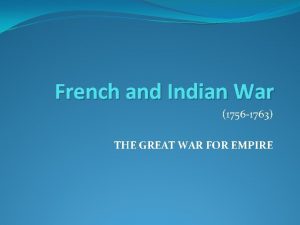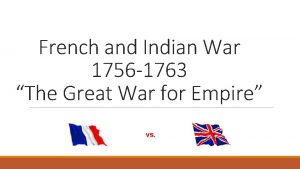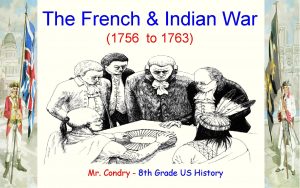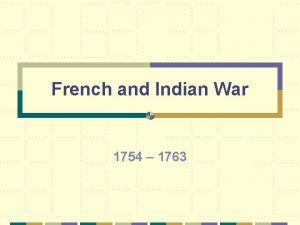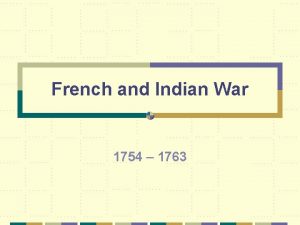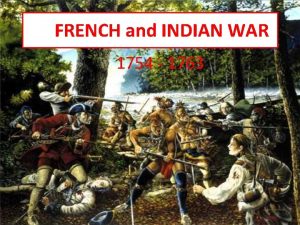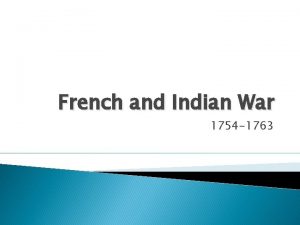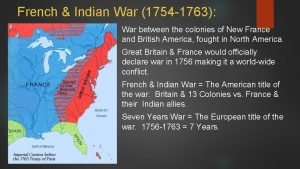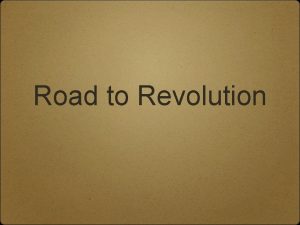The French and Indian War 1756 1763 The















- Slides: 15

The French and Indian War 1756 -1763

The French and Indian War

Resources for Topic 3 Website Links Textbook Outline Textbook Readings Study Groups Introductory Prezi Presentations French and Indian War Self Determination British Tension and Colonial Reaction Declaration of Indep Realities of War Unit Activities Is War Justified Wordle Boston Massacre Enlightenment Declaration of Indep Jeopardy Topic 3 Sections French and Indian War Tension with Britain Taking Up Arms Declaring Independence Winning Independence We have to prepare for Student Led Conferences

Where have we been and Where Are We Going? So now we begin the start of our US History study. We have traveled in time from…. . Pangea to the Age Enlightenment …. . Forward to the Age of Exploration…. . Which leads to the colonization of North America. With the widespread transfer of plants, animals and disease, the Europeans gain control of North America. Specifically, the British Empire established control of what is now the eastern coast of the United States. As time moves on, the colonies grow and develop with increased immigration within regional areas. As the British Empire continues to maintain control, the colonist however are developing their own identity!

In Transition So what really is this new American Identity that was beginning to emerge. There was a new generation of people living in the colonies. We start to see more and more people who had been born in the colonies were now becoming adults and leaders in their communities. People settled into their daily routines of living their lives, trying to make ends meet, raising their children and protecting their families. However, the question remained. Who were these people? Who did they identify themselves as? British citizens living abroad or Americans with a British ancestry!

In Transition There is also this evolution of a dynamic social middle class emerging in these American colonies. With more and more people immigrating to America, a new social class was defining itself as an influential group of people. There were a large amount of immigrants who stayed in the cities, established themselves as small business owners who worked hard which resulted in establishing a middle class community of people. Yet, there were still people who struggled and could not establish themselves. These people along with the slave community were understood as the lower class people. Those families who had established themselves early with the accumulation of land were seen as the upper class community of people. It was these wealthy men who could afford books, an education and ultimately became the established leaders.

In Transition Soon, it became apparent that a tension was beginning to build between the British Empire and the American colonies. These colonial people wanted the freedom to protect their way of life and not to be taken advantage of for the British financial gain. This is what is called Self Determinationism! The British however, only recognized the American colonies with one purpose in mind, “To make money for the Mother country”, that is all! These colonists who recognize their rights as British citizens also insisted on representation. The British soon become very agitated by this new American attitude of un-appreciation. They believed their responsibility as the mother country was to keep these people in order. After all, if the American colonists want their rights to be protected, then they must pay for the right to be a British citizen.

In Transition In addition, as more people came (immigrated) to the colonies, the population grew and people began to move West – but who was responsible to protect the people? And in turn, even in the cities, who was responsible to maintain law and order? Who were the colonists ultimately responsible to if they continued to resist? These colonists insisted that they were British citizens and demanded protection from the Crown. In the West there was conflict with the Native Americans as the Europeans pushed farther into the new frontier. Who was responsible to protect these westward bound pioneers? So now we come the French and Indian War. And it is with this War that colonists start moving closer to demanding Self Determinationism and breaking away from England.

The French and Indian War As tension is building in the American colonies, the British Empire is still at odds with an old enemy, France. The battle for the control of the Americas had been going on ever since the Age of Exploration. The obvious source of the conflict were the natural resources which equates to money and power. France has been fighting the British for hundreds of years. However, with regards to the Americas, an increased tension between the two countries increased with the British practice of Mercantilism (Navigation Acts) which cut the French out of the American trade opportunities. In doing this they were limiting the amount of money that France was able to bring in. Money equates to power and control. Whoever controlled the flow of money through natural resources and shipping ultimately had the upper hand in terms of power.

The French and Indian War France however did not give up. While recognizing they did not have any influence on the eastern coast of North America, they were able to establish a presence farther north (Canada) and on the western frontier, the Ohio River Valley. They learned how to work with the native Americans and to establish a lucrative trading business with them. However, when the British colonists began moving farther West more conflicts grew. It was with these conflicts that the colonists demanded British protection. Ultimately the British overcame the French but at a cost so staggering that it nearly destroyed their government. And it was this debt created by this War that caused the escalation of tensions leading to the Revolutionary War. The end of Salutary Neglect! The British Parliament had two objectives: First, to tax the colonists and force them to pay for the War. Second, to restore political control over the colonies who were beginning to exert their desire for a self directed future.

The French and Indian War Just a few comments about the War itself: It is here that we see the emergence of George Washington, a young colonial soldier who rose through the ranks while fighting on the side of the British. The war started in 1756 and lasted about five years with the British ultimately winning and taking full control of all North America. The Treaty of Paris was signed two years after the conclusion of the war in 1763 which sealed the agreement. However, even though the French recognized and honored the treaty, the native Americans did not and the hostilities continued.

Effects of the War The British victory in the French and Indian War though had a tremendous impact on the British Empire. It meant that the British territorial claims in the New World greatly increased, as well as the British debt. Moreover, the war generated substantial resentment towards the colonists among the British leaders, who were not satisfied with the lack of financial and military support from the colonists during the war. All these factors combined to convinced many British leaders that the colonies needed a major reorganization plan. The war had an equally profound, but very different effect on the American colonists. First of all, the colonists had learned to unite together. Before the war, the thirteen colonies had no common ground and coexisted in mutual distrust. But now they realized that by working togethere was power in cooperation.

Effects of the War To complicate matters, with France now being removed from North America, the vast interior of the continent appeared to be wide open for the Americans to move west and claim their land. However, the English government decided otherwise. To control the population, they issued the Proclamation of 1763 that prohibited colonial settlement west of the line drawn along the Continental Divide. To enforce this Proclamation of 1763 they authorized a permanent army of 10, 000 regulars which was paid for by taxes gathered from the colonies. This infuriated the Americans who after having been held back by the French, now saw themselves stopped by the British in their desire to move West.

The French and Indian War - The Aftermath! To summarize then, the British Empire has won the war and is now in possession of all this land. However, they do not have the man power to protect their citizens, so they pass the Proclamation of 1763, which limits westward expansion. They have also incurred tremendous debt which is impacting the British economy. This idea of Self Determinationism in the colonies is started to catch hold. Likewise there is a resentment being built up in the British Parliament believes the colonies exist to make money, to pay off the British debt and to help protect the new lands. The British and the colonists are not in agreement!

 Causes and effects of the french and indian war
Causes and effects of the french and indian war Where did the french and indian war take place
Where did the french and indian war take place Cause of french and indian war
Cause of french and indian war Causes of french and indian war
Causes of french and indian war French and indian war summary
French and indian war summary French and indian war
French and indian war Brainpop french and indian war
Brainpop french and indian war Who was in debt after the french and indian war
Who was in debt after the french and indian war French and indian war
French and indian war Map of north america 1754
Map of north america 1754 French and indian war
French and indian war French and indian war
French and indian war What were the causes of the french and indian war
What were the causes of the french and indian war French and indian war
French and indian war French and indian war
French and indian war The french and indian war was fought between
The french and indian war was fought between
